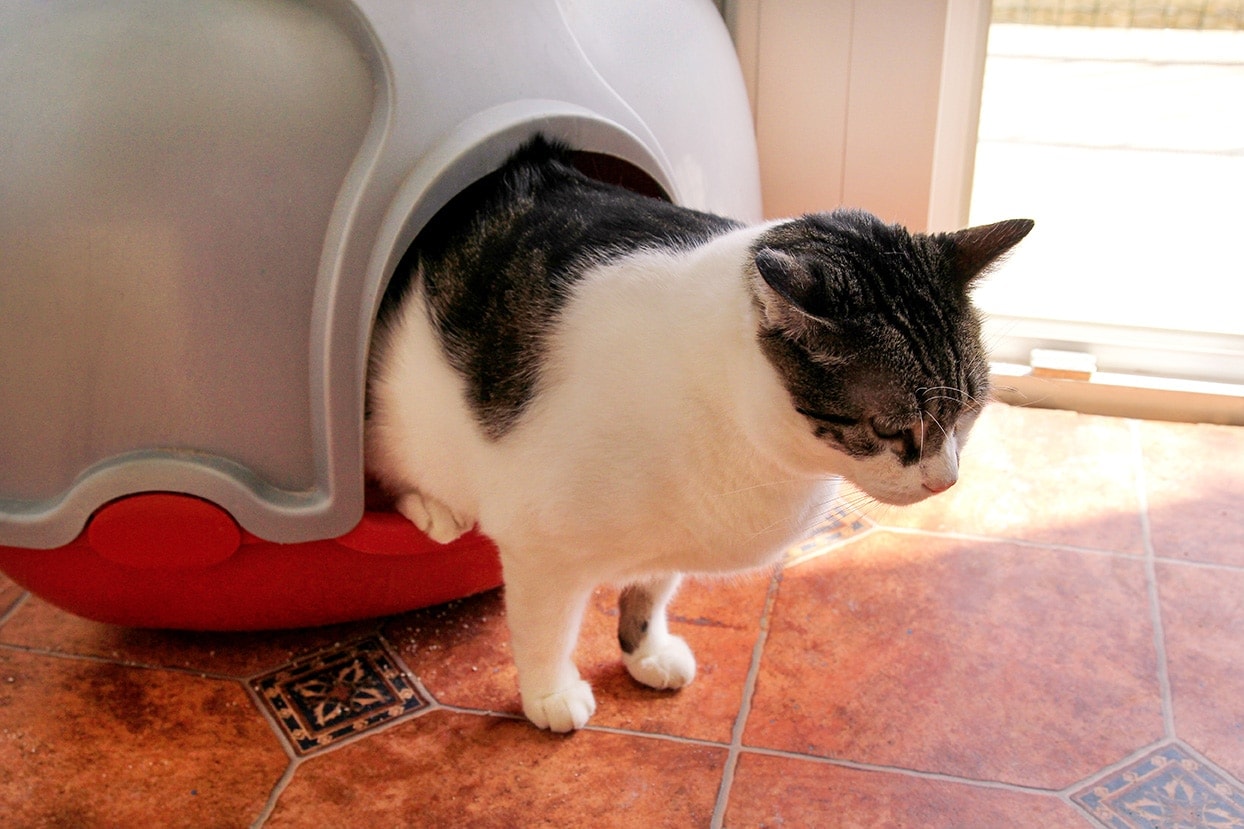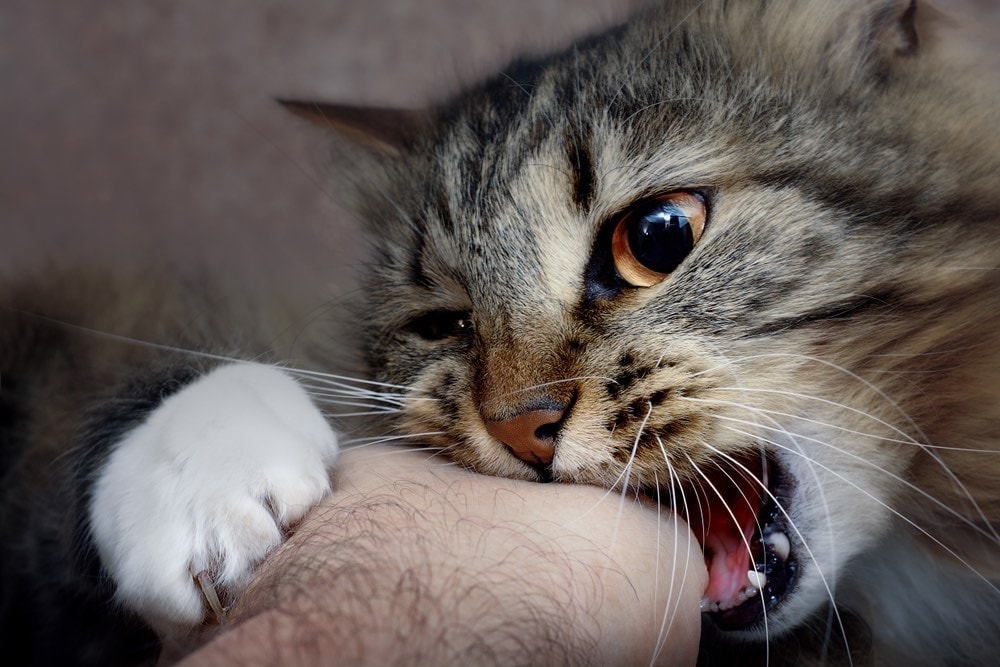Why Does My Cat Attack Me at Night? 8 Vet-Reviewed Reasons & How to Stop It

Updated on

Click to Skip Ahead
Initiating sneak attacks at night after a day of peaceful naps and play times is perhaps one of the strangest habits that cats have, particularly kittens and young adults. Unfortunately for us, nighttime aggression is frequently unprovoked and typically leads to scratches and a disrupted sleep schedule.
Most often these bites are quite gentle and harmless. Some cats will actually do it as a sign of affection, which is often referred to as a love bite. But if their bite is more than this, breaking your skin, or creating a wound, it should be checked out by your doctor, due to the risk of cat scratch disease. You should also seek behavioral and veterinary advice, in order to understand and manage this behavior.
There’s a reason why cats love to play and pounce at night, or even attack or bite their owners, and knowing why will help you solve the problem. This list explains the eight most common reasons and how to solve them.
The 8 Possible Reasons That Your Cat Attacks You at Night
1. Attention Seeking
Some cats will attack you as a way to get your attention, particularly when they know that it’s a surefire way of getting a response from you. Maybe they feel left out because a new family member arrived recently, or perhaps work’s been busy and you’ve been spending less time at home.
Either way, if your cat is feeling neglected, attacking you at night might just be their way of saying, “I’m here! Pay attention to me!” When you’re sitting on the couch with an evening movie or tucked into bed, it might be the only chance that they have to try to get your attention at all.
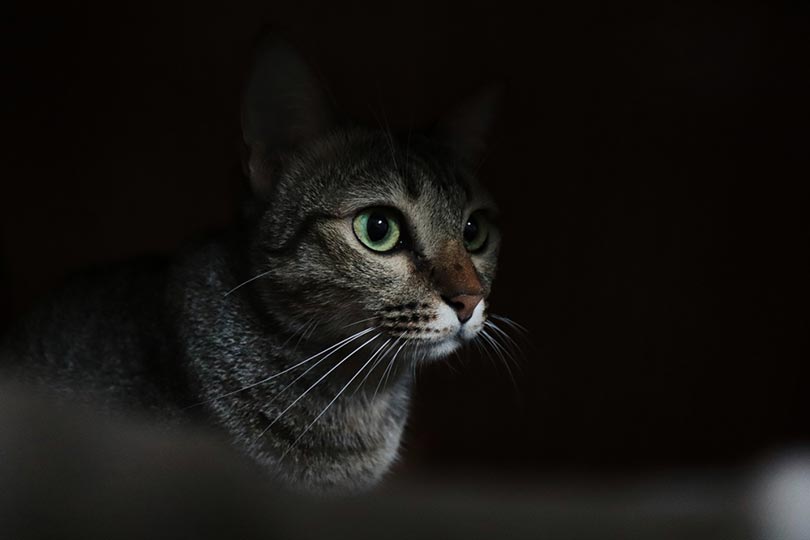
2. They Want Food
Pouncing on you and even gently biting you when you’re asleep in your bed may be a way for your cat to say they’re hungry. Their food bowl may be empty or the food is no longer fresh, and they are expecting a refill. Make sure your cat’s food and water bowls are full in order to avoid them waking you up in this manner.
3. Boredom
A bored cat will seek ways to entertain themselves. They can and often will resort to climbing the walls—or at least the curtains—if necessary. Practicing their hunting skills is one of the ways that they can alleviate boredom, and if they don’t have more suitable targets, they’ll practice on you.
While some cats stick to attacking your feet or your shoelaces throughout the day, others will quite happily pounce on you at all hours of the night. If they step into the room in search of something to do, your unassuming form under the comforter might be too tempting to ignore.
4. Learned Behavior
Aggression can be a learned behavior, and your cat may not realize that their actions are hurting you or that they are unacceptable; they just think that they’re playing. In some cases, you can accidentally teach your kitten that attacking you is okay.
It’s understandable, of course: The first time that they pounce on you at night or attack your wiggling toes is adorable and deserves a smile and a head scratch. However, your kitten will see your response as positive reinforcement, and it may quickly become a habit.
Your kitten attacks you at night for the same reason that they pounce on each other and their toys: They’re teaching themselves how to hunt. Fortunately, you can gently encourage them to practice their skills on more suitable targets, such as toys, especially at night when all you want to do is sleep. Reward them when they redirect their attention to toys for the first time, instead of your toes.
5. Pain or Illness
If your cat has randomly started attacking you at night, it might be a sign that you need to visit a veterinarian as soon as possible. Aggression can be a sign of pain or illness, and your cat might have an injury that they’re hiding, they could be suffering with a declining cognitive function that is more common in older cats, or have an underlying medical condition that causes them to feel unwell and uncomfortable.
Their habit of attacking you at night might be because you rolled over and jostled them in a way that hurt. Maybe your sleepy petting session meant you accidentally touched a painful part of their body.
Pay attention to how your cat behaves and observe any subtle changes. If they show any signs of pain or illness, changes in their behavior and routines, such as a reduced appetite, excessive meowing, limping, lethargy, and many more, a trip to the vet is in order.

6. Crepuscular Activity
One of the things that many people dislike about cats is how active they are at night. They’re frequently believed to be nocturnal, but they’re actually crepuscular. Being naturally more active at dawn and dusk, they’ll likely want to play with each other or their toys or otherwise disturb you while you’re sleeping.
You need to help them adjust to your schedule. Unfortunately, if you get up to try to calm them down or play with them to tire them out, they’ll be more likely to seek attention and playtime again the following night. They’ll see your affection as a positive reward and keep at it. You need to ignore nighttime mischief and reinforce playtime during the day instead, or just before bedtime.
7. Hunting
Whether you have an indoor or outdoor cat, they are hunters. While an outdoor cat will have plenty of targets to direct their hunting instincts at, your indoor feline doesn’t have the same access to wildlife or stray leaves.
Unfortunately for you, your sleepy fidgeting underneath the blanket to get comfortable might awaken your indoor cat’s hunter’s instincts. While you might know that it’s your foot moving beneath the covers, your cat will see it as an enticing thing to pounce on and will likely end up sinking their teeth into your big toe.
8. Anxiety or Fear
Cats can get scared or anxious just like we do, and some of them may resort to biting, if they feel cornered, while most will actually run away and hide. If they’re a rescue animal, they might have had a bad experience with previous owners and may be more prone to aggressive behavior, towards people or other animals in the house.
Maybe there’s a thunderstorm and they’re already on edge, or they feel threatened by another pet not giving them enough space. You mumbling something in your sleep or moving suddenly might have startled them.
If it’s a fear-related response that’s causing the aggression, it’s vital that you don’t yell or punish your cat, but keep the environment calm and quiet. Scaring them further will only make their reaction worse. Instead, you need to reinforce and reward non-aggressive calm behavior, identify what scares them and give them plenty of places to hide. Consult with a veterinarian and a certified feline behaviorist in order to find appropriate ways to manage the problem depending on the root cause.
How to Stop Your Cat from Pouncing and Attacking You at Night
Once you know why your cat is attacking you at night, it’ll be easier to determine how to stop the behavior. It can be as simple as closing the bedroom door if you have one, or it might require a more dedicated approach. For the best results, try a combination of the following tips.
Close the Door
There are a few reasons that not letting your cat into your bedroom is a good idea. It can help create a cat-free space if you have allergies, and it can help you get a good night’s sleep if your cat is more active at night. Shutting the bedroom door is the easiest and most reliable solution to the problem of your cat attacking you when you sleep.
If you’re worried about missing out on your nightly kitty cuddles, though, shutting the door isn’t the only solution. The others just take more time, dedication, and perseverance to work.
Encourage Daytime Play
Your cat might be more active at different hours than you, but that doesn’t mean they can’t adjust to a schedule that matches yours. You can help by encouraging them to be more active during the day.
If you work from home, take plenty of breaks throughout the day to play with your cat. Training them to walk on a leash and taking regular walks can help wear them out too.
If you leave the house to go to work or school, you can encourage playtime during the evenings before bedtime instead. Playing with your cat is a great way to direct their attention to more suitable targets, like a wand toy or a jingle ball.
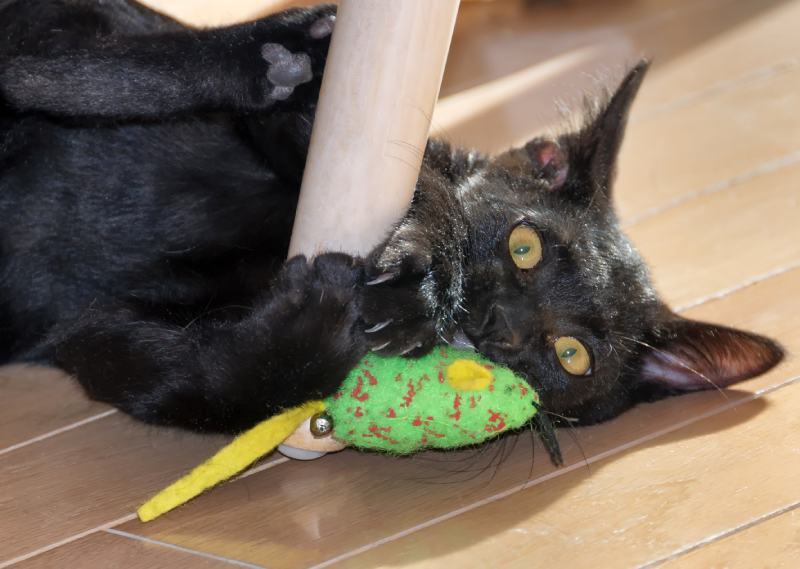
Feed Them Before Bedtime
Eating immediately before bedtime might sound strange, but it can work wonders for your cat. Many cats will curl up for a nap after they’ve eaten, which is perfect if you want to sleep too.
By giving them food immediately before bedtime, you’ll be encouraging your cat to go to sleep afterward. With a full belly, they’ll be happy to curl up on your pillow or their bed and sleep instead of attacking you.
Make a Safe Sleeping Spot
If your cat attacks you because they’re feeling anxious, it might be because they don’t feel safe on your bed. In this case, providing them with a quiet and comfortable place to sleep can help. This can be a simple cat bed in a quiet corner of the living room or a cat tree with sheltered condos. Making sure their cat bed is cozy, soft, and warm, while being in a safe, quiet place outside of any commotion or noise, is a surefire way to encourage them to curl up for a nap.
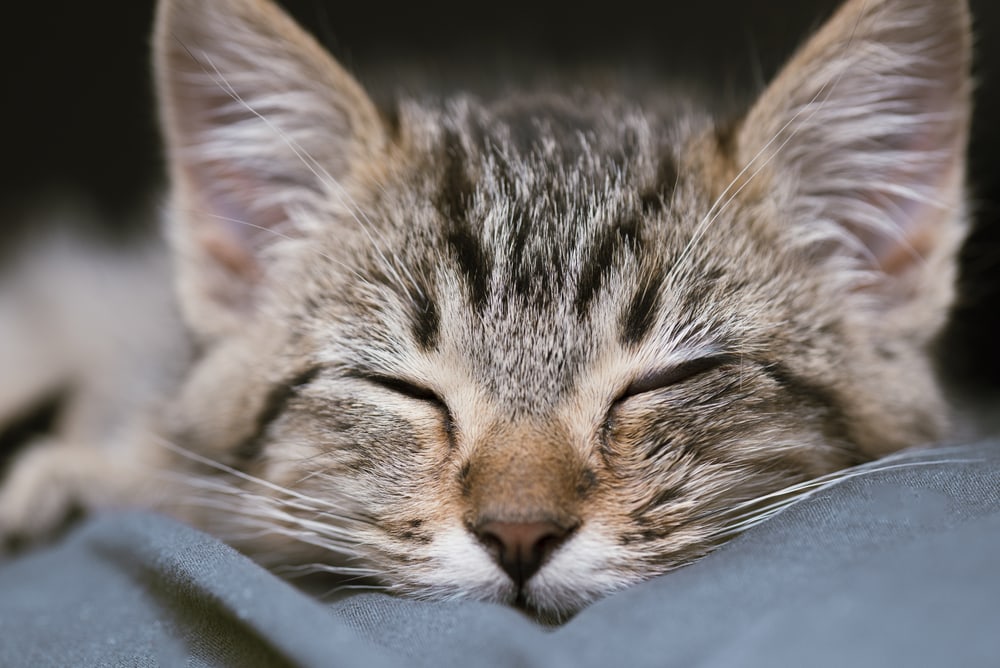
Provide Entertainment
Encouraging playtime throughout the day doesn’t always require your presence. Providing a variety of activities for your cat includes setting up toys or objects that they can play with on their own.
You can set up a cat tree or a perch by their favorite window, use a puzzle toy to challenge them to work for their dinner, or get a battery-operated toy that will move without you around. The more your cat has to do around the house, the less likely they will seek out other targets to expend their energy on and the more tired they’ll be at night. However, make sure they do not attempt to chew or ingest any parts of their toys, and ideally supervise their playtime if possible.
Reinforce Good Behavior
Ignoring your cat when they’re getting into mischief is a difficult task, but it’s necessary if you want to teach them not to disturb you when you’re sleeping. Instead of getting up and scolding them when they attack you during the night, focus on reinforcing non-aggressive play habits during the day.
By giving them attention and treats when they play nicely, you teach them which targets are more acceptable. It’ll take time and patience, but soon, you’ll be able to enjoy a quiet, restful night’s sleep.
Conclusion
Being pounced on at night by a ball of fur, teeth, and claws isn’t fun for anyone—except maybe the feline culprit. Your cat might be bored, in hunting mode, or simply seeking attention. This list covers eight possible reasons that your cat attacks you at night, and we hope that it helps you solve the problem so you and your kitty can enjoy peaceful nights together.
Featured Image Credit: Olga Shusters, Shutterstock


